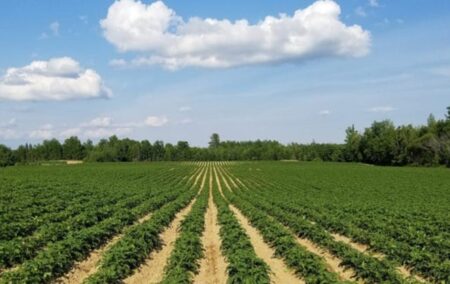The ANC’s ideological opposition to allowing black South Africans to become freehold landowners in a prosperous, property-owning democracy has turned its announcement on releasing 700 000 hectares of ‘vacant and underutilised’ land for agricultural development into a public relations disaster, according to the Institute of Race Relations (IRR).
The IRR pointed out in a statement yesterday that the scheme in no way transfers ownership of property away from the state to citizens.
‘Moreover, the government’s list of properties earmarked for redistribution includes the farm of David Rakgase, who in 2019 won a lengthy court battle that culminated in a court order instructing the state to sell him the land he had been farming for decades.
‘It is clear the government’s attempt to score an easy public-relations win on the issue of land and property rights has backfired.’
Earlier this month, President Cyril Ramaphosa wrote in his weekly newsletter that the government’s land initiative must enable black farmers ‘to not just grow their own businesses but to advance shared wealth and prosperity in the communities in which they farm … (and) dispel the stereotype that only white farmers are commercially successful in South Africa, and that black farmers are perpetually “emerging”’.
But the IRR points out that the plan is ‘doomed to failure because of government capacity constraints and the ANC’s ideological opposition to allowing black South Africans to become freehold landowners’.
The initiative, announced in September by Minister of Agriculture, Land Reform and Rural Development Thoko Didiza, ‘makes no provision for awarding beneficiaries ownership of the land, but rather envisages 30-year, non-transferable, restrictive leases with compulsory training programmes’.
‘In addition, it has since become apparent that, seemingly in approximately a third of cases, “vacant and underutilised” land earmarked for redistribution is already occupied and being actively utilised – and, cynically, includes David Rakgase’s farm.’
As a result of his determined battle against the government, ‘Mr Rakgase, an industrious black farmer of repute, has become a prominent figure in the debate surrounding property rights in South Africa’.
The IRR said the government’s ‘indefensible treatment of Mr Rakgase exposes its deep-seated hostility to private land ownership and insistence on state ownership’.
‘By bungling the rollout of its newest scheme, aimed at dressing up state ownership of land as something other than modern feudalism, the ANC has shown itself to be uninterested in actual solutions to issues of land ownership and ignorant of the real state of the land – who occupies it, who uses it, and who owns it.
IRR Deputy Head of Policy Research Hermann Pretorius commented: ‘People honestly interested in finding solutions make the effort to understand problems, data, and the realities of life in South Africa. In contrast, political ideologues, insulated from reality, pursue pipedreams, sacrificing the homes, farms and livelihoods of ordinary people to appease the twin ideological gods of state ownership and centralised power.
‘Far from being a step in the right direction, Minister Didiza’s latest attempt to put a positive spin on the state’s cack-handed handling of land reform starkly illustrates the lies told by the government and its allies in the property rights debate: No, property rights are not being undermined with the virtuous intention of correcting past injustices and creating a class of black landowners. Let us remember the position of government in the Rakgase case, as set out in its court papers. These made clear that redistribution policy rests on the “principle that black farming households and communities may obtain 30-year leases, renewable for a further 20 years, before the state will consider transferring ownership to them”.
Pretorius added: ‘Again and again, the ANC’s policy engagement on property rights illustrates its intention to erode private property ownership. From mineral rights to land to pensions and savings, the constant in the ANC’s policies is denying South Africans ownership of what they have worked hard to earn.’

